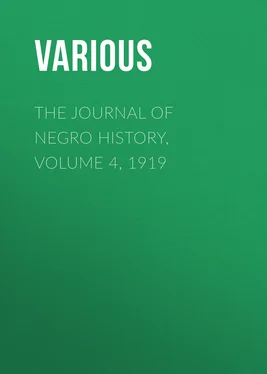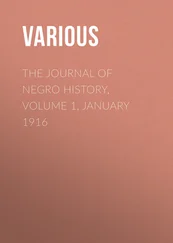Various - The Journal of Negro History, Volume 4, 1919
Здесь есть возможность читать онлайн «Various - The Journal of Negro History, Volume 4, 1919» — ознакомительный отрывок электронной книги совершенно бесплатно, а после прочтения отрывка купить полную версию. В некоторых случаях можно слушать аудио, скачать через торрент в формате fb2 и присутствует краткое содержание. Жанр: foreign_antique, periodic, История, foreign_edu, на английском языке. Описание произведения, (предисловие) а так же отзывы посетителей доступны на портале библиотеки ЛибКат.
- Название:The Journal of Negro History, Volume 4, 1919
- Автор:
- Жанр:
- Год:неизвестен
- ISBN:нет данных
- Рейтинг книги:5 / 5. Голосов: 1
-
Избранное:Добавить в избранное
- Отзывы:
-
Ваша оценка:
- 100
- 1
- 2
- 3
- 4
- 5
The Journal of Negro History, Volume 4, 1919: краткое содержание, описание и аннотация
Предлагаем к чтению аннотацию, описание, краткое содержание или предисловие (зависит от того, что написал сам автор книги «The Journal of Negro History, Volume 4, 1919»). Если вы не нашли необходимую информацию о книге — напишите в комментариях, мы постараемся отыскать её.
The Journal of Negro History, Volume 4, 1919 — читать онлайн ознакомительный отрывок
Ниже представлен текст книги, разбитый по страницам. Система сохранения места последней прочитанной страницы, позволяет с удобством читать онлайн бесплатно книгу «The Journal of Negro History, Volume 4, 1919», без необходимости каждый раз заново искать на чём Вы остановились. Поставьте закладку, и сможете в любой момент перейти на страницу, на которой закончили чтение.
Интервал:
Закладка:
There is surely some adequate cause for such a movement. The majority of the committee have utterly failed to find it, or, if found, to recognize it. When it was found that any of their own witnesses were ready to state causes which did not accord with their theory they were dismissed without examination, as in the cases of Ruby and Stafford, and a half dozen others who were brought from Kansas, but who on their arrival here were found to entertain views not agreeable to the majority.
We regret that a faithful and honest discussion of this subject compels a reference to the darkest, bloodiest, and most shameful chapter of our political history. Gladly would we avoid it, but candor compels us to say that the volume which shall faithfully record the crimes which, in the name of Democracy, have been committed against the citizenship, the lives, and the personal rights of these people, and which have finally driven them in utter despair from their homes, will stand forever without a parallel in the annals of Christian civilization. In discussing these sad and shameful events, we wish it distinctly understood that we do not arraign the whole people nor even the entire Democratic party of the States in which they have occurred. The colored and other witnesses all declare that the lawlessness from which they have suffered does not meet the approval of the better class of Democrats at the South. They are generally committed by the reckless, dissolute classes who unfortunately too often control and dominate the Democratic party and dictate its policy. We have no doubt there are many Democrats in the South who deeply regret this condition of things, and who would gladly welcome a change, but they are in a helpless, and we fear a hopeless, minority in many sections of that country.
The unfortunate and inexcusable feature of the case is that, however much they may deplore such lawlessness, they have never, so far as we can learn, declined to accept its fruits. They may regret the violence and crimes by which American citizens are prevented from voting, but they rejoice in the Democratic victories which result therefrom. So long as they shall continue thus to accept the fruits of crime, the criminals will have but little fear of punishment or restraint, and the lawless conduct which is depopulating some sections of their laboring classes will go on. There is another unfortunate feature of this matter. So long as crimes against American citizenship shall continue to suppress Republican majorities, and to give a "solid South" to the Democracy, there will be found enough Democrats at the North who will shut their eyes to the means by which it is accomplished, and seek to cover up and excuse the conduct of their political partisans at the South.
This is well illustrated by the report of the majority of the committee. In the presence of most diabolic outrages clearly proven; in the face of the declaration of thousands of refugees that they had fled because of the insecurity of their lives and property at the South, and because the Democratic party of that section had, by means too shocking and shameful to relate, deprived them of their rights as American citizens; in the face of the fact that it has been clearly shown by the evidence that organizations of colored laborers, one of which numbered ninety-eight thousand, have existed for many years and extending into many States of the South, designed to improve their condition by emigration—in the face of all these facts the majority of the committee can see no cause for the exodus growing out of such wrongs, but endeavor to charge it to the Republicans of the North.
In view of this fact, it is our painful duty to point out some of the real causes of this movement. It is, however, quite impossible to enumerate all or any considerable part of the causes of discontent and utter despair which have finally culminated in this movement. To do so would be to repeat a history of violence and crime which for fifteen years have reddened with the blood of innocent victims many of the fairest portions of our country; to do so would be to read the numberless volumes of sworn testimony which have been carefully corded away in the crypt and basement of this Capitol, reciting shocking instances of crime, crying from the ground against the perpetrators of the deeds which they record. The most which we can hope to do within the limits of this report is to present a very few facts which shall be merely illustrative of the conditions which have driven from their homes, and the graves of their fathers an industrious, patient, and law-abiding people, whom we are bound by every obligation of honor and patriotism to protect in their personal and political rights and privileges.
We begin with the State of North Carolina because the migration from that State has been comparatively insignificant, and also because the conditions there are more favorable to the colored race than in any of the other cotton States of the South. Owing to the lack of funds, and to the time employed in the examination of witnesses called by the majority the Republican members of the committee summoned no witnesses from the State of North Carolina, and were obliged to content themselves with such facts as could be obtained from one or two persons who happened to be in this city, and such other facts as were brought out upon cross-examination of the witnesses called by the other side. By the careful selection of a few well-to-do and more fortunate colored men from that State, the majority of the committee secured some evidence tending to show that a portion of the Negroes of North Carolina are exceptionally well treated and contented, and yet upon cross-examination of their own witnesses facts were disclosed which showed that, even there, conditions exist which are ample to account for the migration of the entire colored population.
There are three things in that State which create great discontent among the colored people: First, the abridgment of their rights of self-government; second, their disadvantages as to common schools; third, discriminations against them in the courts; and, fourth, the memory of Democratic outrages. Prior to Democratic rule the people of each county elected five commissioners, who had supervision over the whole county, and who chose the judges of elections. The Democrats changed the constitution so as to take this power from the people, and gave to the general assembly authority to appoint these officers. This they regard not only as practically depriving them of self-government, but, as stated by one of the witnesses, Hon. R. C. Badger, as placing the elections, even in Republican townships, wholly under the control of the Democrats, who thereby "have the power to count up the returns and throw out the balance for any technicality, exactly as Garcelon & Co. did in Maine." This creates much dissatisfaction, because they believe they are cheated out of their votes. The Negro values the ballot more than anything else, because he knows that it is his only means of defense and protection. A law which places all the returning boards in the hands of his political opponents necessarily and justly produces discontent.
Next to the ballot the Negro values the privileges of common schools, for in them he sees the future elevation of his race. The prejudice even in North Carolina against white teachers of colored schools seems to have abated but little since the war. Mr. Badger, when cross-examined on this point, said:
Q. Is there any prejudice still remaining there against white teachers of colored schools?—A. I think there is.
Q. Will you explain it?—A. I cannot explain it, except by the prejudices between the races.
Q. You mean, white persons teaching a colored school lose social status?—A. Yes, sir.
Q. Now, a white lady who comes from the North and teaches a colored school, to what extent is she tabooed?—A. I don't think she would have any acquaintances in white society.
Читать дальшеИнтервал:
Закладка:
Похожие книги на «The Journal of Negro History, Volume 4, 1919»
Представляем Вашему вниманию похожие книги на «The Journal of Negro History, Volume 4, 1919» списком для выбора. Мы отобрали схожую по названию и смыслу литературу в надежде предоставить читателям больше вариантов отыскать новые, интересные, ещё непрочитанные произведения.
Обсуждение, отзывы о книге «The Journal of Negro History, Volume 4, 1919» и просто собственные мнения читателей. Оставьте ваши комментарии, напишите, что Вы думаете о произведении, его смысле или главных героях. Укажите что конкретно понравилось, а что нет, и почему Вы так считаете.












